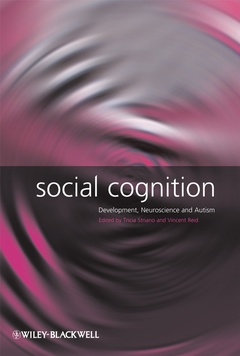Social Cognition Development, Neuroscience and Autism
Coordonnateurs : Striano Tricia, Reid Vincent

Fortunately, our understanding of how humans process and interpret each other's actions has increased by leaps and bounds in the past decade. At the vanguard of these encouraging developments has been groundbreaking research in the fields of cognitive neuroscience, developmental psychology, and autism. Social Cognition: Development, Neuroscience and Autism is the first volume to fully integrate these areas of cutting-edge research on social cognition through contributions from some of the world's foremost experts in all three disciplines.
The text is edited by distinguished development specialists who preface each section with chapter by chapter summaries that seamlessly link each of the contributing essays. Sections include related chapters on perspectives on social cognition, social cognition during infancy, social cognition and the adult brain, and social cognition: the challenge of autism. The text's final section serves as a commentary highlighting the fundamental issues that have been addressed in the text. Social Cognition: Development, Neuroscience and Autism is an indispensable addition to the rapidly expanding field of social cognition?and will provide valuable new insights on how we think and learn.
Abbreviations.
Preface.
Part One Research and Social Cognition.
1. Social Cognition at the Crossroads: Perspectives on Understanding Others (Tricia Striano and Vincent Reid).
2. Research Methodology and Social Cognition (Vincent Reid and Elena Geangu).
Part Two Cognitive Neuroscience.
Editors’ Introduction.
3. Do Adolescents Simulate? Developmental Studies of the Human Mirror Neuron System (Marco Iacoboni).
4. The Inhibition of Imitative Behavior and Attribution of Mental States (Marcel Brass and Stephanie Spengler).
5. Social Perception: Understanding Other People’s Intentions and Emotions through their Actions (Julie Grèzes and Beatrice de Gelder).
6. Development of the Social Brain during Adolescence (Sarah-Jayne Blakemore).
7. How do we Understand Others’ Intentions? An Attentional Investigation (Pines Nuku and Harold Bekkering).
Part Three Social Cognition during infancy.
Editors’ Introduction.
8. Memories for Events in Infants: Goal-Relevant Action Coding (Ildikó Király).
9. The Interchange of Self-Performed Actions and Perceived Actions in Infants (Petra Hauf).
10. Tools and Goals: A Social-Cognition Perspective on Infant Learning of Object Function (Birgit Elsner).
11. The Directed-Attention Model of Infant Social Cognition: Further Evidence (Vincent Reid and Tricia Striano).
12. Reading Faces in Infancy: Developing a Multi-Level Analysis of a Social Stimulus (Tobias Grossmann and Amrisha Vaish).
13. The Perception of Emotional Expressions during Infancy (Stefanie Hoehl.
Part Four Social Cognition: The challenge of autism.
Editors’ Introduction.
14. Face and Gaze Processing in Autism (Robert Joseph and Helen Tager-Flusberg).
15. Beyond Social Perception: The Case of Autism (Jessica Hobson and R. Peter Hobson).
16. The Role of Looking in Social Cognition: Perspectives from Development and Autism (Claes von Hofsten and Gustaf Gredebäck).
17. What Does the Study of Autism Tell us about the Craft of Folk Psychology? (Richard Griffin and Daniel Dennett).
18. The Other End of the Spectrum? Social Cognition in Williams Syndrome (Jon Brock, Shiri Einav, and Deborah M. Riby).
Part Five Commentaries.
19. Commentary: Mutual Recognition as a Foundation of Sociality and Social Comfort (Philippe Rochat).
20. Commentary on Social Cognition: Development, Neuroscience, and Autism (Charles Nelson).
21. Commentary: How Social is Social Cognition? (Simon Baron-Cohen).
Index.
Vincent Reid is a lecturer in psychology at Durham University, England. He has authored numerous papers on early social-cognitive development across a broad array of topics from the neural correlates of biological motion detection through to goal anticipation.
Date de parution : 09-2008
Ouvrage de 376 p.
17.9x25.4 cm



